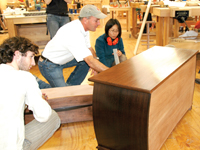

<p><img class=" alignright size-full wp-image-169" style="margin: 5px; float: right;" src="http://schoolnewsnz.fastrackdev.com/wp-content/uploads/2011/10/woodworking.jpg" alt="woodworking" width="200" height="150" />It might not seem the most glamorous of career choices but it may well be a very good one,</p>
<p> <!--more--> </p>
<p>especially where excellent wood skills are combined with an entrepreneurial flair.</p>
<p>Those with the ability to be creative with wood have a number of advantages. One is that they are in a good position to work for themselves. They have the opportunity to set up their own business as a house builder, boat builder, furniture maker or even crafting precision musical instruments.</p>
<p>Most young people with a natural skill in wood will find their career in the building industry. There will always be a demand for new houses, with some estimates of a shortage in New Zealand of several thousand dwellings. It will take many years even to complete the rebuilding of Christchurch. But those who make their career in working with wood have a wide variety of choices and a number of specialist schools to choose from to take their skills to the highest level.</p>
<p>Boat building and fitting out is very strong in New Zealand.New Zealanders love the sea and the marine industry is one of our largest manufacturing industries with over $ 2.2 billion in annual sales. The industry employs more than 10,000 people, and more than 200 companies employ around 600 apprentices.</p>
<p>With its international reputation for producing extremely valuable craft, the industry also attracts many overseas customers. They can usually afford the best the world has to offer but come here because they know the standards our craftspeople can reach. Exports from the sector are already achieving well over $700 million and are forecast to reach $1.8 billion by 2020.</p>
<p>Those who make wooden furniture also have the opportunity of a rewarding career, but here the game has changed with most large-scale production now computer controlled and carried out in other countries such as China. However, head tutor at the Centre for Fine Woodworking in Nelson, John Shaw, says there are good <a class="wpil_keyword_link" href="https://www.schoolnews.co.nz/2015/10/developing-opportunities-at-school-with-a-view/" title="opportunities" data-wpil-keyword-link="linked" target="_blank">opportunities</a> for skilled craftspeople of independent mind.</p>
<p>&#8220;Competition now means competing with mass production from overseas. But if you are in niche areas, such as fitting out boats or making limited-edition furniture, where it is possible to apply high levels of hand skill, then I think there is great future here. We&#8217;re great problem solvers and very flexible in our approach.&#8221;</p>
<p>The focus had to be on high quality, Mr Shaw said. &#8220;Then, it&#8217;s deciding exactly where you are going to apply those skills and determining what that niche market is – doing the research to make sure you&#8217;ve established sound relationships with the market. As New Zealand has a small population, more often than not, that market will be overseas.&#8221;</p>
<p>Mr Shaw had just returned from America where he said he was amazed at the number of people earning a good living crafting very high-quality guitars and other musical instruments. He saw the same opportunities here, for young men and women.</p>
<p>&#8220;Woodworking is an exciting environment if you have the right aptitude. But you have to be able to develop your own business.&#8221;</p>

NZEI Te Riu Roa is considering legal action against the government for the disestablishment of…
NZQA is implementing AI-marking for all Year 10 written assessments from this year onwards, following…
Teaching personal financial responsibility isn't enough. Children should be taught broader economic context, argue New…
When students can't hear the teacher, they can't learn properly. Sound quality matters in education…
The Garden City is rich with learning opportunities, no matter what subject or part of…
Teaching Council of Aotearoa launch school leaders’ stories project with Unteach Racism to challenge institutional…
This website uses cookies.